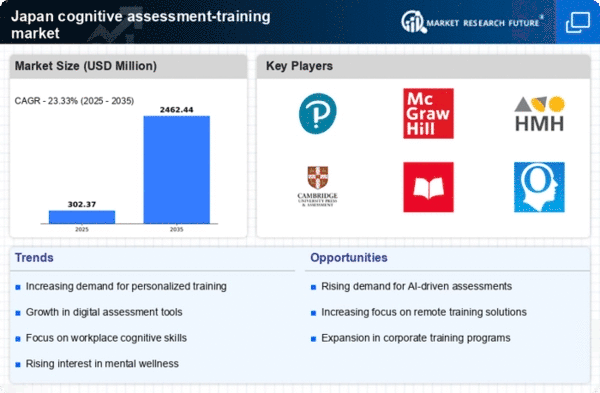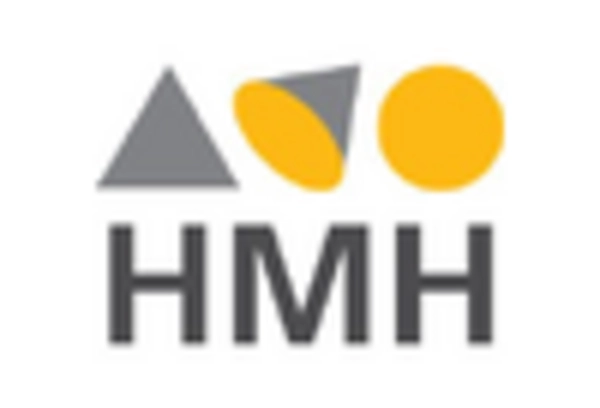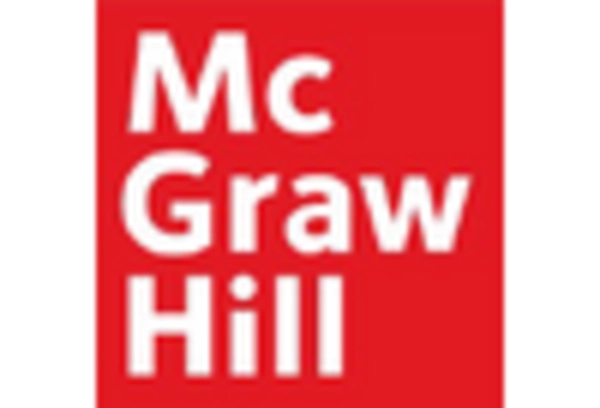Government Initiatives and Support
The Japanese government has been actively promoting initiatives aimed at enhancing cognitive skills among its population, which significantly impacts the cognitive assessment-training market. Various programs have been introduced to support educational institutions in integrating cognitive training into their curricula. For instance, the Ministry of Education has allocated funding for research and development in cognitive training methodologies, which is expected to bolster the market. Additionally, public awareness campaigns are being launched to highlight the benefits of cognitive training, further encouraging participation from both individuals and organizations. This governmental support is likely to create a more favorable environment for the cognitive assessment-training market, potentially leading to increased adoption of cognitive assessment tools and training programs across various sectors.
Rising Demand for Cognitive Skills
The cognitive assessment-training market in Japan is experiencing a notable increase in demand for cognitive skills development. This trend is largely driven by the growing recognition of the importance of cognitive abilities in both educational and professional settings. As industries evolve, employers are increasingly seeking candidates with strong cognitive skills, which has led to a surge in training programs aimed at enhancing these abilities. According to recent data, the market is projected to grow at a CAGR of approximately 8% over the next five years. This growth is indicative of a broader shift towards prioritizing cognitive training as a means to improve workforce productivity and innovation. Consequently, educational institutions and corporate entities are investing in cognitive assessment tools to better evaluate and enhance the cognitive capabilities of their students and employees, thereby fueling the expansion of the cognitive assessment-training market.
Increased Focus on Lifelong Learning
The concept of lifelong learning is gaining traction in Japan, significantly influencing the cognitive assessment-training market. As the workforce ages and the demand for continuous skill development rises, individuals are increasingly seeking opportunities to enhance their cognitive abilities throughout their careers. This shift is prompting organizations to invest in cognitive training programs that cater to employees at various stages of their professional lives. Recent surveys indicate that approximately 60% of companies are now offering cognitive training as part of their employee development initiatives. This focus on lifelong learning not only benefits individual career advancement but also contributes to overall organizational performance, thereby propelling the growth of the cognitive assessment-training market.
Growing Awareness of Cognitive Health
There is a burgeoning awareness of cognitive health among the Japanese population, which is positively impacting the cognitive assessment-training market. As individuals become more conscious of the importance of maintaining cognitive function, there is an increasing demand for training programs that promote cognitive well-being. This trend is particularly evident among older adults, who are seeking ways to enhance their cognitive abilities and prevent decline. Market Research Future suggests that the segment of cognitive training aimed at older adults is expected to grow by approximately 15% in the coming years. This heightened awareness is driving both public and private sectors to develop and promote cognitive assessment tools and training programs, thereby fostering growth in the cognitive assessment-training market.
Technological Advancements in Training Tools
Technological advancements are playing a crucial role in shaping the cognitive assessment-training market in Japan. The integration of artificial intelligence and machine learning into training tools has enhanced the effectiveness and accessibility of cognitive assessments. These technologies allow for personalized training experiences, adapting to the unique needs of each individual. Furthermore, the rise of online platforms has made cognitive training more accessible to a broader audience, including remote workers and students. As a result, the market is witnessing a shift towards digital solutions, with an estimated 30% of training programs now being delivered online. This trend not only increases the reach of cognitive training but also improves engagement and retention rates among participants, thereby driving growth in the cognitive assessment-training market.
















